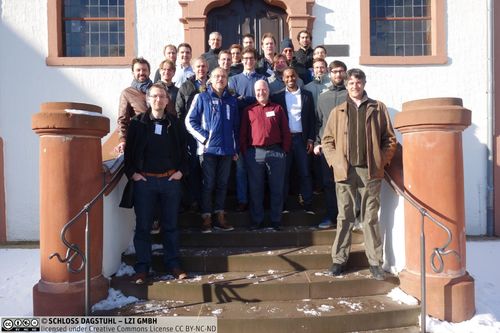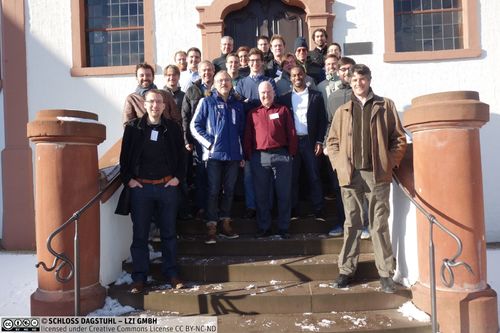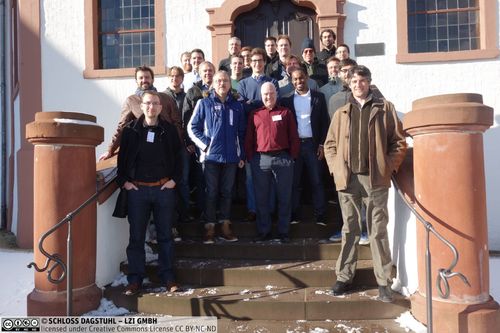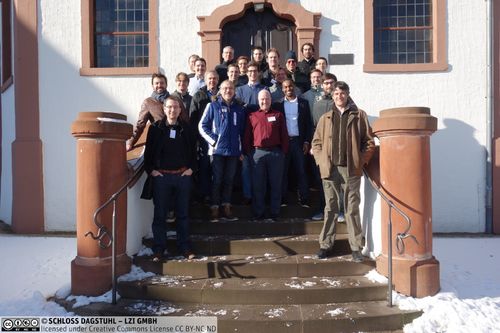Dagstuhl Seminar 17032
Network Function Virtualization in Software Defined Infrastructures
( Jan 15 – Jan 18, 2017 )
Permalink
Organizers
- David Hausheer (TU Darmstadt, DE)
- Oliver Hohlfeld (RWTH Aachen, DE)
- Diego R. Lopez (Telefonica I+D - Seville, ES)
- Bruce MacDowell Maggs (Duke University - Durham, US)
- Costin Raiciu (University Politehnica of Bucharest, RO)
Contact
- Andreas Dolzmann (for scientific matters)
- Annette Beyer (for administrative matters)
Network management currently undergoes massive changes towards realizing more flexible management of complex networks. Recent efforts include slicing data plane resources by using network (link) virtualization and applying operating system design principles in Software Defined Networking (SDN). Driven by network operators, network management principles are currently envisioned to be even further improved by virtualizing network functions which are currently realized in dedicated hardware appliances. The resulting Network Function Virtualization (NFV) paradigm abstracts network functions from dedicated hardware to virtual machines running on commodity hardware and enables a Cloud-like network management. All of these efforts contribute to a softwarization of communication networks. This softwarization represents a significant change to network design and management by allowing the application of operating system design and software engineering principles to make network management more efficient, e.g., by enabling flexible and dynamic service provisioning.
Since the many NFV efforts are driven by carriers and standardization bodies, academic research is decoupled from current industry driven NFV attempts in redesigning network management. Due to this missing link to academic research, manifold opportunities for groundbreaking research and broad impact in academia are missing out. This Dagstuhl Seminar aims to provide this missing link to foster collaborations and joint research initiatives. Thus, this seminar particularly aims at identifying the diverse connections between industry driven NFV efforts and current academic networking research. As a result, this seminar aims at categorizing research challenges and at defining a joint research agenda.
Topics of interest in this seminar will include:
- Performance aspects
- Standardization aspects
- Security and privacy aspects
- Energy efficiency
- Network verification, network reliability, and end-user experience
- Techno-economic aspects
- Orchestration and (automated) management of virtualized services
- Deployment of new / OTT services (e.g., virtualized CDNs)
 Oliver Hohlfeld
Oliver Hohlfeld
Network management currently undergoes massive changes towards realizing more flexible management of complex networks. Recent efforts include slicing data plane resources by using network (link) virtualization and applying operating system design principles in Software Defined Networking (SDN). Driven by network operators, network management principles are currently envisioned to be even further improved by virtualizing network functions which are currently realized in dedicated hardware appliances. The resulting Network Function Virtualization (NFV) paradigm abstracts network functions from dedicated hardware to virtual machines running on commodity hardware and enables a Cloud-like network management. All of these efforts contribute to a softwarization of communication networks.
This softwarization represents a significant change to network design and management by allowing the application of operating system design and software engineering principles to make network management more efficient, e.g., by enabling flexible and dynamic service provisioning.
Since the NFV efforts are currently mainly driven by carriers and standardization bodies, academic research is decoupled from the industry driven NFV attempts in redesigning network management. Due to this missing link to academic research, opportunities for groundbreaking research and broad impact in academia are currently missing out. This Dagstuhl Seminar thus gathered researchers from academia, industry, and standardization bodies to establish this missing link by fostering collaborations and joint research initiatives. Thus, a particular focus of the seminar was on identifying the diverse connections between industry driven NFV efforts and current academic networking research.
The seminar brought together 24 participants in January 2017 to discuss a potential NFV research agenda within 2.5 days. The program included different invited talks that provided an overview on selected aspects of NFV and lightning talks by each participants to provide first research questions and to sketch research directions. We summarize each talk in the remainder of this report. The main focus of the seminar was then the in-depth discussion the research areas identified in the lightning talks in several breakout sessions, which we also summarize. We closed the seminar by collecting and discussing several opinions from each participant: (i) lessons learned and surprises on NFV during the seminar and (ii) open research questions. We further collected controversial statements on NFV research and asked the seminar participants on whether they agree or disagree to each presented statement. We summarize the outcomes at the end of the report.
 David Hausheer, Oliver Hohlfeld, Diego R. Lopez, Bruce MacDowell Maggs, and Costin Raiciu
David Hausheer, Oliver Hohlfeld, Diego R. Lopez, Bruce MacDowell Maggs, and Costin Raiciu
- Theophilus Benson (Duke University - Durham, US) [dblp]
- Christian Esteve Rothenberg (State University of Campinas, BR) [dblp]
- Aaron Gember-Jacobson (Colgate University - Hamilton, US) [dblp]
- Gabriela Gheorghe (PwC - Luxembourg, LU) [dblp]
- David Hausheer (TU Darmstadt, DE) [dblp]
- Oliver Hohlfeld (RWTH Aachen, DE) [dblp]
- Felipe Huici (NEC Laboratories Europe - Heidelberg, DE) [dblp]
- Andreas Kassler (Karlstad University, SE) [dblp]
- Wolfgang Kellerer (TU München, DE) [dblp]
- James Kempf (Ericsson - Santa Clara, US) [dblp]
- Dirk Kutscher (Huawei Technologies - München, DE) [dblp]
- Diego R. Lopez (Telefonica I+D - Seville, ES) [dblp]
- Bruce MacDowell Maggs (Duke University - Durham, US) [dblp]
- Oliver Michel (University of Colorado - Boulder, US) [dblp]
- Leonhard Nobach (TU Darmstadt, DE) [dblp]
- Costin Raiciu (University Politehnica of Bucharest, RO) [dblp]
- Fernando M. V. Ramos (University of Lisbon, PT) [dblp]
- Jan Rüth (RWTH Aachen, DE) [dblp]
- Michael Scharf (NOKIA - Stuttgart, DE) [dblp]
- Fabian Schneider (NEC Laboratories Europe - Heidelberg, DE) [dblp]
- Laurent Vanbever (ETH Zürich, CH) [dblp]
- Timothy Wood (George Washington University - Washington, D.C., US) [dblp]
- Andreas Wundsam (Big Switch Networks - Santa Clara, US) [dblp]
- Thomas Zinner (Universität Würzburg, DE) [dblp]
Classification
- networks
Keywords
- Network function virtualization
- Software-defined networking
- Flexible network management





 Creative Commons BY 3.0 DE
Creative Commons BY 3.0 DE
